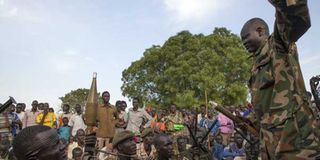South Sudan army admits loss of key oil town of Bentiu

Members of the White Army, a South Sudanese anti-government militia, listen to a speech given by Gathoth Gatkuoth (R) during a rally in Nasir on April 14, 2014. PHOTO | ZACHARIAS ABUBEKER
What you need to know:
- The conflict in South Sudan has left thousands dead and forced around a million people to flee their homes since fighting broke out on December 15
- Rebel chief Machar told AFP on Monday his forces would target crucial oilfields
JUBA
South Sudan's army said Wednesday rebels had wrested control of the key oil town of Bentiu, one of the most bitterly contested regions in the four-month-long conflict.
The town, capital of oil-producing Unity state, is the first major settlement to have been retaken in a renewed offensive by forces of rebel leader Riek Machar, a former vice-president.
"We are moving forward to retake the town from the forces of Riek Machar, who entered the town on Tuesday after our forces withdrew," army spokesman Philip Aguer told AFP, accusing the rebels of "committing atrocities including the killing of civilians."
Rebels had previously seized Bentiu in December at the beginning of the conflict, but were chased out of it a month later.
"The rebels were killing innocent people as they entered, there were killings at the hospital, in the market and mosque," Aguer added, although the reports could not be independently confirmed.
UN peacekeepers were patrolling the town, the mission said, including sending armoured carriers to guard the hospital and protect patients and staff.
He had no reports of clashes on Wednesday due to communication problems, but said it "was highly likely there was fighting."
The conflict in South Sudan has left thousands dead and forced around a million people to flee their homes since fighting broke out on December 15 in the capital Juba before spreading to other states in the oil-rich nation.
UN Secretary General Ban Ki-moon warned Wednesday that more than one million people were at risk of famine in the troubled country.
"We are seeing evidence of extremely high levels of malnutrition among hundreds of thousands of people displaced by the conflict, especially women and children," he stressed.
Ban called for an end to the fighting and a political resolution to the conflict.
OIL FIELDS TARGETED
The fighting is between soldiers loyal to President Salva Kiir against mutinous troops who sided with Machar, who was dismissed as vice-president in 2013.
The conflict has also taken on an ethnic dimension, pitting Kiir's Dinka tribe against militia forces from Machar's Nuer people.
But Aguer also accused gunmen from across the border in Sudan -- from the Arab Misseryia community, as well as Janjaweed militia from Sudan's war-torn Darfur region -- of backing Machar's forces, although the claims could not be verified.
Sudanese rebels fighting Khartoum's government -- from the Darfuri Justice and Equality Movement (JEM) -- have in turn been previously reported by security sources to have backed Juba's army.
Rebel chief Machar told AFP on Monday his forces would target crucial oilfields, vowing that the war will not end until the country's president is removed from power.
The rebels, who celebrated the capture of Bentiu on Tuesday, issued at the same time an ultimatum to oil companies to shut down production.
Aguer said that the rebels had launched an attack on an oil refinery under construction near Bentiu at Lalop, but that it remained under the army's control.
Before fighting broke out in the young nation, which won independence from Sudan less than three years ago after a decades of civil war, oil provided more than 95 per cent of its government budget.
As well as Bentiu, key towns -- including the Upper Nile state capital Malakal and Jonglei state capital Bor -- have swapped hands several times in the conflict.





